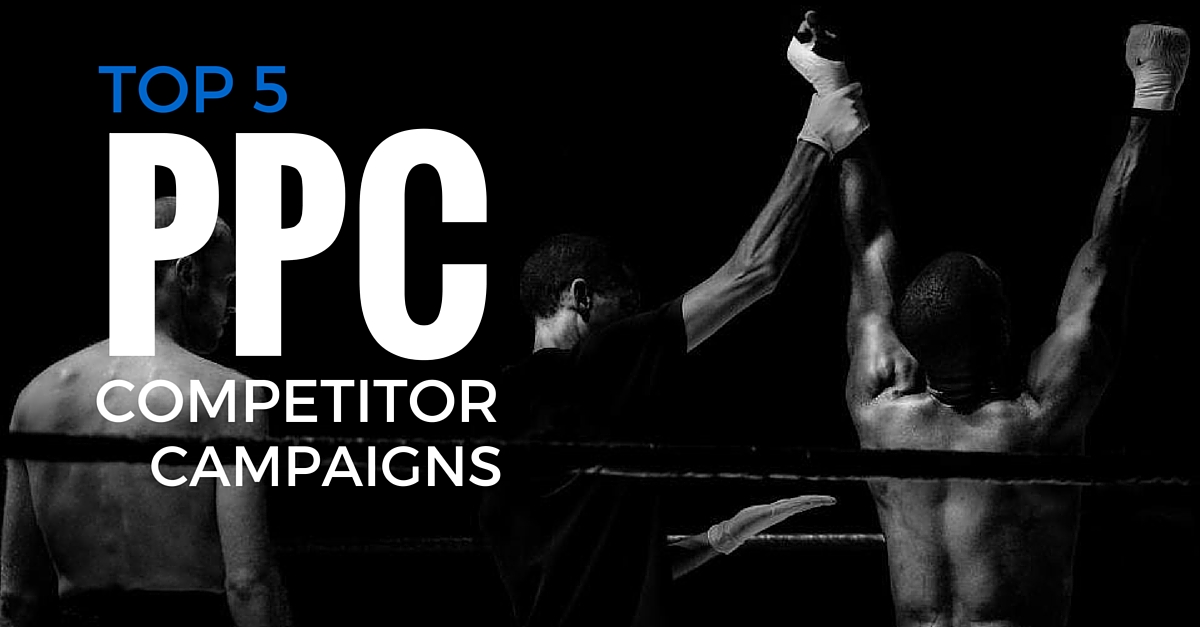
Pay-Per-Click Advertising has evolved into an extremely competitive beast in recent years. It can be equally as effective when done correctly, but the days of companies setting up their own campaigns and checking on them every other month are over.
PPC agencies and in-house PPC teams are in a state of constant recon to find new profitable honey holes. Sometimes the best honey holes are a competitor’s branded keywords, but it’s often the quickest way to aggravate the beehive.
Below are some of our favorite competitor pay-per-click campaigns: what we like, what we don’t like, and what to watch for over the year …
1. Home Advisor warns searchers of “Her List”.
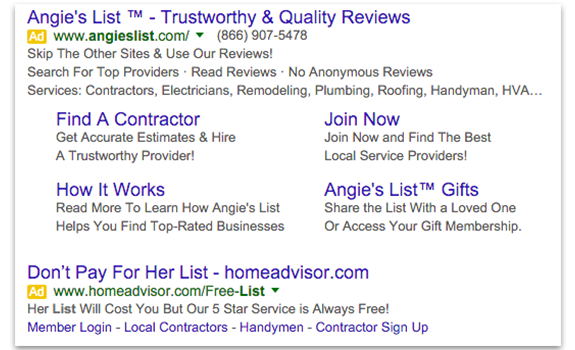
What We Like:
Home Advisor does a fantastic job of blatantly calling out Angie’s List. It’s one of the best uses of third person talk in advertising we have seen. They identify in the copy and display URL that “Her” list costs money, while the Home Advisor list is free.
What We Don’t Like:
Angie’s List does not have a great rebuttal to their fee structure or identify the value of paying for their service. We know Angie’s List is in a continuous state of Ad Testing, so we can’t be positive this is a current champion PPC ad, but in our opinion it doesn’t steal back any attention that Home Advisor might have stolen.
What To Watch For:
There is little doubt in our mind that Home Advisor is running a successful competitor PPC campaign. In this case, it would seem that any searcher owes it to themselves to see what Home Advisor offers. Keep an eye out for Angie’s list to launch a massive campaign against Home Advisor or be forced to prove what truly differentiates the two.
2. Online mattress companies desperate to crush each other.
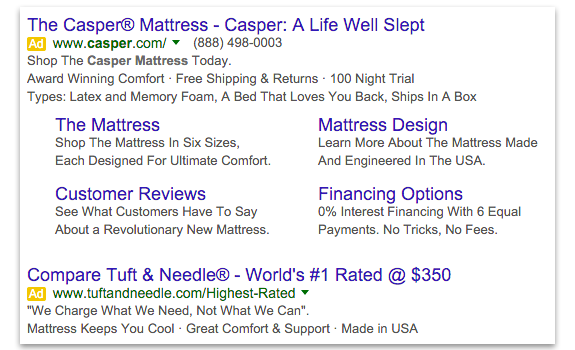
What We Like:
The online mattress world is a true war in a new, modern, retail-free industry. As a PPC agency, this is fun to watch. The leaders include Tuft and Needle, Saatva, Casper, Loom and Leaf, Helix Sleep, GhostBed and NovosBed. With no retail presence for these companies, success is going to come down to the brilliant minds in their marketing departments. Some of them appear to be gaining pay-per-click domination quicker than others too.
What We Don’t Like:
The mattresses are all seemingly the same. They each have some great testimonials, news features, competitive pricing, free trials, etc. Some of these companies could be destroyed by the competition solely because their PPC team was not as good. It is the nature of the industry but a harsh reality to the companies that lose their chance of becoming a major leader.
What To Watch For:
Keep an eye out for some of the brands to drop out of the competitors PPC war. We think Tuft & Needle is going to be the front-runner by the end of 2016 for their shocking truth approach to the industry. In due time, it will not be profitable for everyone to bid on everyone.
Extra Note:
This research results in a mattress browser-retargeting takeover.
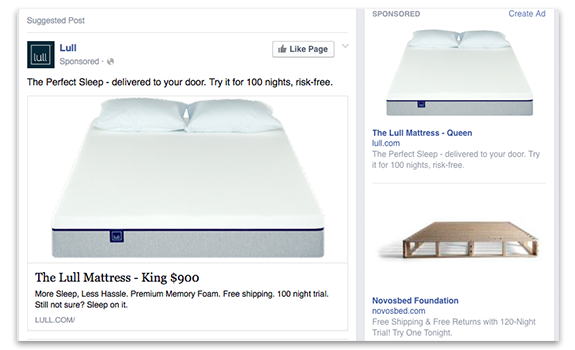
3. Match wants you to meet someone special – as long as it’s on Match.com.
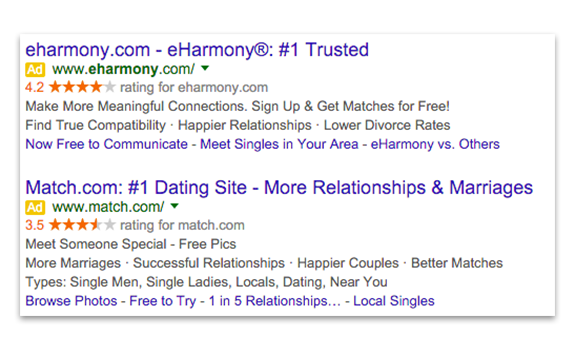
What We Like:
The online dating industry is relatively more mature than the other PPC competitors we are analyzing. We can see how the evolution of competition has shaped the two dating giants into what they are. Both Match.com and eHarmony both have very similar ad copy, extensions, and benefits that have likely been shaped over the past few years.
What We Don’t Like:
Match is not taking a particularly aggressive approach to a pay-per-click campaign meant to oust eHarmony. We aren’t impressed with any of their benefits over the brand we were searching for. In their defense though, we don’t know what the primary goal of this campaign is.
What To Watch For:
Probably not much will change in either brands’ competitor PPC campaigns. There will likely be ad copy changes over the year, but the industry is common for sharing and trading customers. We are guessing that it is just as important to be second place as it is to be the best.
4. Lyft vs. Uber
What We Like:
We really like that Lyft is taking a more quantitative strategy to beat Uber. As we have seen in a previous post, Uber is running a very tight testing operation. This copy might not be a champion, but Uber does seem to be focusing on being “cool”, while Lyft is giving straight facts on what to expect when driving with them. Lyft is also working our city and the “$1200/week” guarantee into the display URL. It is not entirely complicated, but still impressive to implement on a large scale.
What We Don’t Like:
Lyft does not address people that are possibly just looking for a ride. It may not be their current goal, but a simple extension similar to Uber could be beneficial. To be fair though, we don’t have a full scope of their account. There is also a lack of differentiators between the two brands. It would be great to see something along the lines of “90% of our drivers prefer driving for Lyft” or “Uber drivers make 25% more on average” to really get aggressive.
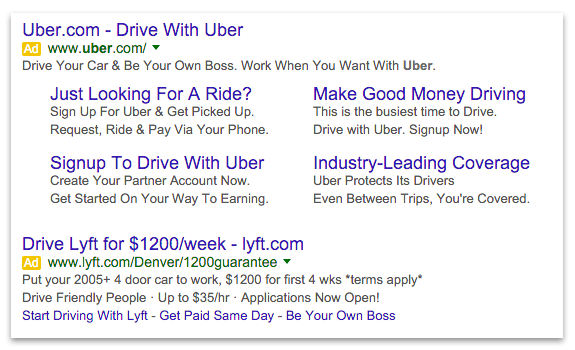
What To Watch For:
We should see some interesting data as the two companies grow and use that data against each other. We will also likely see the rise of other competitors. It will be exciting to see how competitors differentiate themselves. Personally, I’m a Lyft fan, but we could see Uber pull ahead further this year.
5. Shave clubs with a sharp blade to each other.
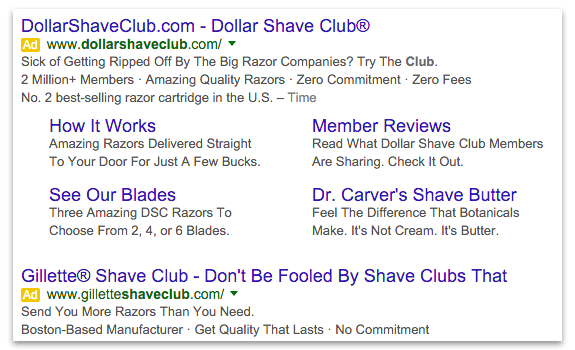
What We Like:
Dollar Shave Club and Gillette are both in heavy competition against each other. DSC does have some strong selling points such as “2 Million+ Members” and “No. 2 best-selling razor cartridge in the U.S – Time”. DSC is also very clearly against “Big Razor Company” which solidifies their unique offering. However, I’ll give Gillette credit. I was interested in DSC but imagined that the volume of razors would pile up and be wasteful. Gillette’s main competitor ad is “Don’t be fooled by shave clubs that send you more razors than you need” which directly spoke to my concern for DSC.
What We Don’t Like:
Honestly, there is nothing about these campaigns that I don’t think are expertly strategized. Both are clearly aware that they are at risk of losing tons of money to each other, and it shows in a very well executed campaign.
What To Watch For:
There is going to be continuous ad copy testing with these two. Nearly every search brings up a new ad set. Both seem to be fighting aggressively for increases in click through rates and conversion rates. If I had to guess, it looks like DSC is putting more time into their PPC strategy and is running more testing across ads and landing pages. I think DSC will win the pay-per-click competition for the seamless flow from ad to landing page to purchase and a solid abandoned cart campaign to bring non-converters back.
Pro-tip: If you wait long enough, they send you a free month.
